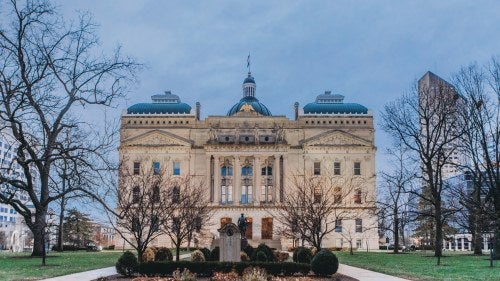What's Ailing Midwestern Legislatures?

The Indiana state legislature recently passed a bill, signed into law by Gov. Mike Pence, would allow businesses to discriminate against LGBTQ+ people.
What ails the state legislatures of the Midwest, anyway? Do they take a joint oath to spend their time in office destroying the economies and good names of their states? Or do they just act that way?
The question is raised by the bill passed by the Indiana legislature and signed by Gov. Mike Pence that, in effect, authorizes businesses in that state to discriminate against gays and lesbians. Pence has said that “we’re not going to change the law,” while telling the Indianapolis Star that he does plan to change it, “to clarify the intent.”
This is the sort of rhetorical tar pit that politicians fall into when they do something dumb without thinking how it will look to the outside world. Pence and the Indiana legislature can take comfort, though, in knowing that they aren’t alone.
Iowa passed a bill making English the state’s official language, knowing it would insult the immigrants that the state needs to survive. Wisconsin’s legislature and its governor, Scott Walker, have declared war on that state’s teachers unions and the University of Wisconsin, not exactly an enlightened way to greet the new knowledge era. The Kansas legislature seems to exist only as a font of bad ideas, the latest being a bill (not yet passed) that would bar the state’s college professors from including their job titles—that is, their qualifications—in op-eds they write about politics. This is the same legislature that is (1) cutting $9.4 million from the state’s support for the University of Kansas while (2) considering a bill that would force that university to play Wichita State every year in basketball.
The Illinois legislature may be too deep in the tar pit to get out. Decades of blithe refusal by that legislature to fund the pension funds of public employees, especially teachers, have left the state teetering toward bankruptcy. Solutions exist, but many legal experts say they may be unconstitutional.
What were these people thinking, if “thinking” is the right word? Why would any legislature think that a potential bankruptcy would bring new businesses flocking to its state? Or that slashing education budgets and dissing teachers would produce the educated citizens that any state needs these days? Or that a well-publicized hostility to evolution (Kansas, again) would hold up the state to anything but ridicule?
Or, for that matter, why would any state think that now is the right time to enshrine discrimination against gays and lesbians, just at the moment when a majority of Americans—and, presumably, a majority of investors—support same-sex marriage?
The new Indiana law prohibits any other state laws that “substantially burden” a person’s ability to follow his or her religious beliefs. The bill’s definition of “person” includes businesses. In other words, a business may refuse to serve a potential customer for religious reasons. The bill is widely seen as a way for religiously motivated businesses to reject gay or lesbian customers, especially to provide any services to a same-sex wedding.
Other states, including Illinois, have similar laws, but they also have equal rights laws that take precedence. Indiana doesn’t. Pence said an equal rights law “is not on my agenda.”
The reaction, inside and outside Indiana, has been terrific. Businesses in small towns such as Valparaiso have signed on to a growing movement to display “We Serve Everybody” signs. A Northwest Indiana columnist said that, as an Indianan, he wasn’t surprised, just embarrassed. The state’s businesses, especially in tourism and conventions, are fit to be tied. Even the NCAA, headquartered in Indianapolis and hardly a progressive tribune, has expressed dismay that the Final Four will be played in the Indiana capital next weekend, and has hinted it may seek a different venue in the future. The Christian Church (Disciples of Christ), also based in Indianapolis, has said it will move its 2017 General Assembly, and its 6,000 people, out of the state.
Chicago Mayor Rahm Emanuel has called on Indiana businesses to move to more tolerant Chicago. This isn’t likely to have any more effect than Indiana’s past attempts to poach businesses from Illinois, but it does demonstrate the state’s new role as a national laughingstock.
Indiana politicians say the bill is meant to protect religious freedom, not to discriminate against any group. Not surprisingly, nobody believes them. Rather, the incident recalls the attempt a half-century ago by Southern states to refuse service to African Americans, under the guise of protecting states’ rights. Indiana is often called the “Mississippi of the Midwest” for its relatively low living standards and now appears anxious to live up to this name.
Trapped inside state lines drawn two centuries ago, all are split by an urban-rural divide. Each remains proudly parochial, ignorant of the global economy, imagining they are in competition with the states next door, answering to rural voters instead of the cities that increasingly dominate their economies and steer their futures (the mayor of Indianapolis, a Republican, opposed that anti-gay law as strongly as anyone).
It’s tempting to think that the solution is to get rid of state governments. Tempting, but not likely. We’re stuck with the federal system, which means we’re stuck with know-nothing assemblies such as the Indiana legislature. Eventually, democracy may solve the problem but, until then, ridicule must do the work.

